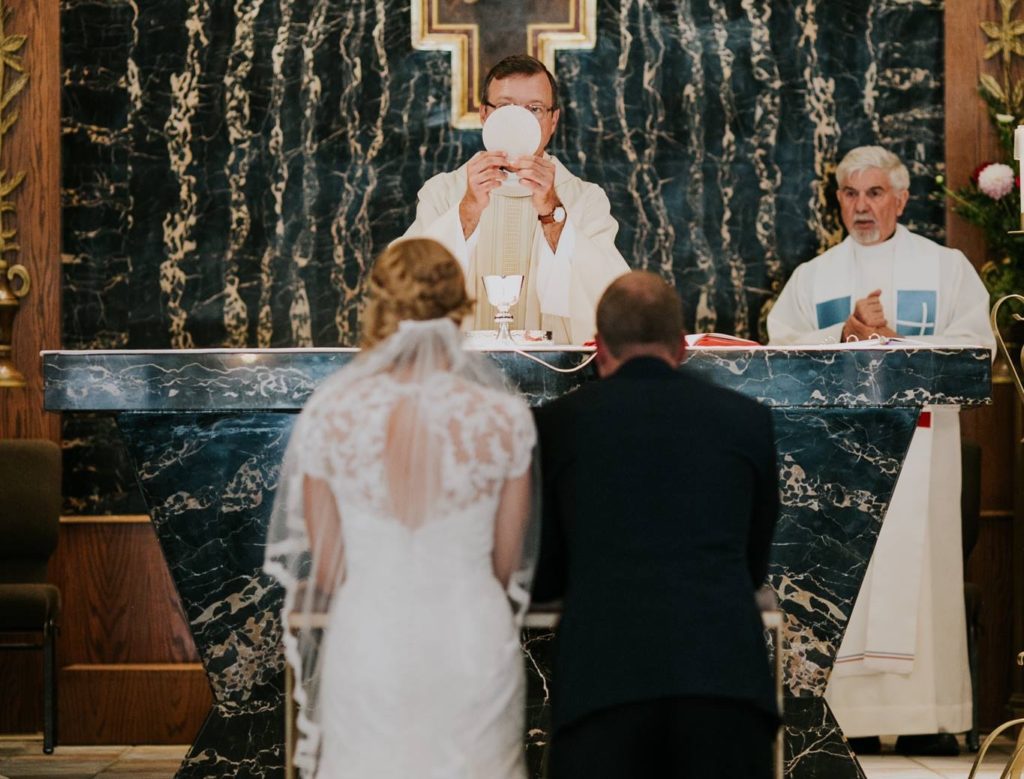The Twelve Steps of recovery and the sacraments of the Catholic Church work in a very similar way. While some of the steps and each of the sacraments have great ritual and reverence around them regarding initiation, each are to be continually practiced. Finding a source to continue practicing these principles in all of our affairs comes in the name of our Lord and Savior Jesus Christ in a very tangible way. This week the Church celebrates the Solemnity of the Blood and Body of Christ. We hear from Jesus in the 6th chapter of John’s Gospel:
Whoever eats my flesh and drinks my blood
remains in me and I in him.
Just as the living Father sent me
and I have life because of the Father,
so also the one who feeds on me
will have life because of me.
This is the bread that came down from heaven.
Unlike your ancestors who ate and still died,
whoever eats this bread will live forever.
The source of our eternal life is found in Christ. We are given a tangible way to physically remain in His flesh. If you have an opportunity this week, read all of the 6th Chapter of John’s Gospel and count the number of times Christ refers to “having life”. We are given the opportunity to participate in this grace-filled sacrament every week—actually every day—through receiving the Eucharist at mass.
Step Ten gives us the tools to stay active in the grace we receive through the Eucharist by “continuing to take personal inventory and when we were wrong promptly admitted it.” There is a spiritual principle of perseverance woven within this step that can be found when we continue to do the spiritual work that got us to this point. That means remaining humble, admitting our powerlessness over our addictions, taking an honest inventory, sharing it with God and another human being, asking God to remove our shortcomings, and making amends when it will bring healing and justice to situations we’ve harmed.
This may sound like a lifestyle that is unreachable. Perseverance does not come on our own self-will. Remember, you are not alone and will find the necessary support from the strength of God, the fellowship of the Holy Spirit, and the group of individuals you will find walking a similar journey. Even if this is a stage of the Twelve Steps you have not worked through, there is still a lot of spiritual wisdom found in discussing these principles.
The most painful place to be is living in bondage because the plight of the desert seems to daunting and demanding. Let’s unify in His name and in His flesh, and pray for the willingness to overcome fear and doubt about what lies ahead. We walk together, being honest with each other and sharing a common solution to our spiritual obstacles. Freedom lies ahead.
Diving further into the mystery of the Eucharist, Ronald Rolheiser explains:
“We participate in Jesus’ sacrifice for us when we, like him, let ourselves be broken down, when we, like him, become selfless. The Eucharist, as sacrifice, invites us to become like the kernels of wheat that make up the bread and the clusters of grapes that make up the wine, broken down and crushed so that we can become part of communal loaf and single cup…
What is supposed to happen at the Eucharist is that we, the congregation, by sacrificing the things that divide us, should become the body and blood of Christ. More so than the bread and wine, we, the people, are meant to be changed, to be transubstantiated.
The Eucharist, as sacrifice, asks us to become the bread of brokenness and the chalice of vulnerability.” (Our One Great Act of Fidelity)
The only way we can keep the love of Christ in our hearts is by giving Him away so that the world can know Him. Our recovery becomes lasting once we offer our own vulnerability to others so that they may also find new life. Both require a transformation.
Reflection Questions: What sources of nourishment give you strength to remain in the grace you’ve received from the Lord? What opportunities do you have to be vulnerable with another person this week that may strengthen your relationship with them and the Lord?
Going Further: Working Step Ten
- Each evening, review your day and connect with your consciousness.
- Pray to be free from self-pity and morbid reflection as you ask yourself:
- Was I resentful, selfish, dishonest or afraid?
- Do I owe an apology?
- Have I kept something to myself which should be discussed with another person at once?
- Was I kind and loving toward all?
- What could I have done better?
- Was I thinking of ourselves most of the time?
- Or was I thinking of what I could do for others, of what I could pack into the stream of life?
Photo Credit: Elissa Voss

